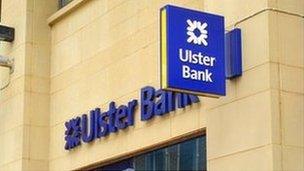Ulster Bank: A tale of two cities
- Published

The Dublin-based part of Ulster Bank is in a worse condition
The half-year results for Ulster Bank show some improvement on the same period last year with losses reducing to £329m. But, as John Campbell reports, the company still has a big unresolved problem with mortgages in the Republic of Ireland.
In July, Ulster Bank's top managers held a presentation for investors at which they explained how they were going to create a "Really Good Bank".
The presentation contained an unprecedented level of detail about the differing performance of the bank's businesses on either side of the Irish border.
It showed that on almost every measurement the Dublin-based part of the bank is in a worse condition.
It earned about 70% of the bank's income in 2012, but was responsible for about 90% of its £1bn losses.
The Belfast-based bit of the bank had a conservative loan-to-deposit ratio of 80%. In Dublin, the ratio was 152%.
Net interest margin is an expression of how much the bank earns from the basic business of lending money: in Belfast it was just over 3%, in Dublin it was just 1.6%.
And the main reason for that divergence on the interest margin comes down to one financial product: tracker mortgages.
These were very popular in the Republic of Ireland during the boom years - the interest rate is fixed at a certain level above the European Central Bank (ECB) base rate, often for the lifetime of the mortgage.
Homeowners taking these mortgages were effectively betting that the ECB would keep rates low.
That is a gamble that has paid off because the crisis in the Eurozone means the rate is at a rock bottom 0.5% and is unlikely to move up anytime soon.
For the banks it has been a disaster; trackers are mostly loss-making as the interest charged is less than the banks' cost of funding.
A whopping 65% of the Ulster's total mortgage book in the Republic consists of lifetime trackers.
In total Ulster holds £13bn of tracker mortgages.
That is £13bn of the bank's capital tied up in a business that basically makes no money.
It is also nearly impossible to persuade - or force - people with trackers to come off them.
Dublin 'woes'
Or as the Ulster's chief financial officer put it in banker-speak: "The margin on that business is around 90 basis points so that constitutes a significant drag...It is also a drag that's relatively difficult to relieve and the mortgage book has a long life and it will take some time to roll off."
But that is not the end of the Dublin-based mortgage woes.
The analysts also heard that while 4.4% of Ulster's residential mortgages in Northern Ireland were "90 days or more past due" (i.e. had not been paid in three months) in the Republic, it was more like 16%.
These diverging north/ south performances raise an intriguing possibility at a time when the whole shape of the bank's parent, RBS, is under review.
Could the whole Dublin part of the bank, with its troublesome mortgages, be spun off into a "bad bank" while the Belfast bit remains in the RBS family?
The bank insists it remains committed to all its customers across the island and sees opportunities for future growth.
But whether those sentiments are shared by its main shareholder, the UK government, remains to be seen.
- Published4 June 2013
- Published28 February 2013
- Published3 January 2013